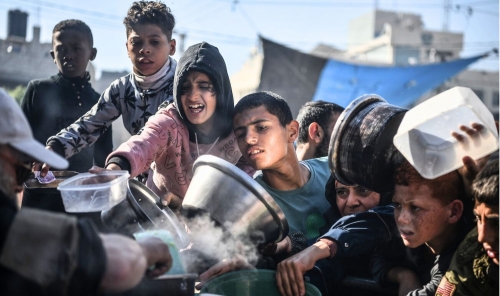Gaza Food Prices Soar After Israel Halts Aid Deliveries
TDT | Manama
Email : editor@newsofbahrain.com
Food prices in Gaza have skyrocketed, and aid food parcels may soon run out following Israel's decision to block humanitarian aid deliveries, according to the United Nations’ humanitarian agency. This halt has led to a significant increase in the cost of basic goods, with flour and vegetables prices doubling in some areas.
Local reports indicate that the prices of essential food items have surged dramatically, causing extreme hardship for residents. For example, the cost of tomatoes has risen from five shekels ($1.38) to 10 shekels per kilogram, and cucumbers have seen a similar increase. Many Gaza residents, including families with children, are now struggling to afford basic necessities, with some unable to purchase enough food to meet their needs.
If the blockade continues, at least 80 community kitchens that rely on aid food parcels may soon run out of supplies, and the remaining food parcels, which are intended to support around 500,000 people, are expected to deplete quickly.
The decision to stop the aid deliveries was made by Israeli Prime Minister Benjamin Netanyahu, who accused Hamas of hoarding supplies and stealing aid intended for civilians. Netanyahu's office also claimed Hamas had used the aid to finance its operations. In response, Hamas rejected these accusations, calling the suspension of aid "blackmail."
The humanitarian situation in Gaza has drawn concern from European governments. France, Germany, and the UK issued a joint statement condemning the move, calling it a violation of international humanitarian law and stressing that humanitarian aid should not be used as a political bargaining tool. The foreign ministers also emphasized the need to ensure continued flows of aid to Gaza and the release of all hostages held by Hamas.
In Gaza, residents are feeling the immediate effects of the blockade. Merchants have raised their prices, citing higher wholesale costs, and some are exploiting the situation to make a profit. A merchant in Gaza City explained that sugar prices, for example, have jumped from 3 or 4 shekels to 6 shekels, a result of increased costs from wholesalers.
Medical and hygiene supplies are also severely affected by the blockade. While organizations like Doctors Without Borders (MSF) have some reserves of medical supplies, the overall situation remains dire, particularly with regards to fuel for generators at hospitals. MSF has warned that these shortages could have devastating consequences for Gaza’s health system.
The ceasefire between Israel and Hamas, which began in January 2025, allowed for a temporary reprieve, with aid trucks entering Gaza on a regular basis. However, after the first phase of the ceasefire ended and Hamas rejected the proposed extension, aid deliveries were suspended, leading to the current crisis.
The international community, including Qatar and Egypt, has strongly condemned Israel's decision, accusing it of using food and aid as a weapon of war. Israel, however, insists that it is Hamas, not the civilians, who are responsible for the shortages, claiming the group has stockpiled supplies for months.
As the situation worsens, the prospects for civilians in Gaza are becoming increasingly uncertain, with growing concerns about food and medical shortages as the blockade continues.
Related Posts

